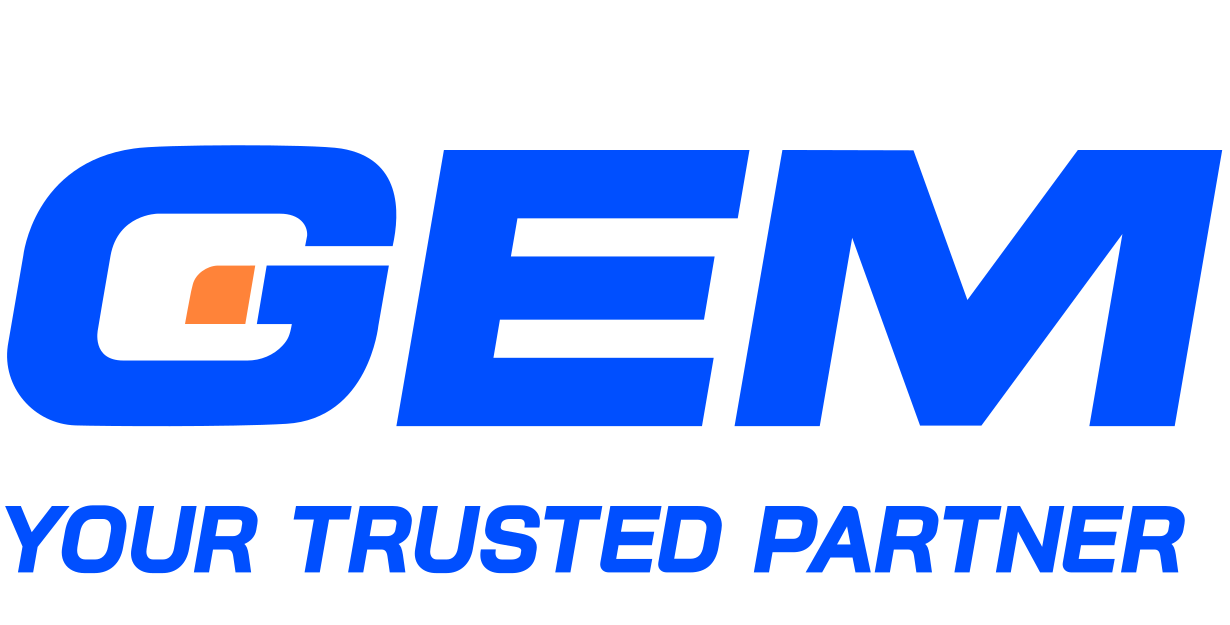Contents
- How Artificial Intelligence is A Huge Leap in Healthcare
- Top 25+ Artificial Intelligence Companies in Healthcare
- 1. GEM Corporation
- 2. NVIDIA
- 3. Medtronic
- 4. Tempus
- 5. PathAI
- 6. Enlitic
- 7. Qure.ai
- 8. Cleerly
- 9. Verily
- 10. Amazon (AWS)
- 11. Microsoft
- 12. Aidoc Medical
- 13. CloudMedX
- 14. Komodo Health
- 15. Cera
- 16. XpertDox
- 17. Augmedix
- 18. Verantos
- 19. Sword Health
- 20. K Health
- 21. RapidAI
- 22. CodaMetrix
- 23. Butterfly Network
- 24. AI Superior
- 25. Arterys
- 26. Corti
- 27. Oncora Medical
- Potentials of Artificial Intelligence Solutions by Healthcare Companies
- Takeaways
Artificial intelligence is quickly taking its stance as a key force shaping how diagnostics, treatment planning, and operational workflows are evolving across the global healthcare sector. The healthcare AI market is projected to reach USD 102.7 billion by 2028, reflecting growing demand for data-driven decision support and precision tools. In this article, we spotlight 25+ top AI companies in healthcare that are setting the pace through clinical-grade platforms, predictive analytics, and scalable infrastructure. Each company on the list plays a distinct role in redefining how providers, payers, and patients interact with health systems. Take a closer look at who is leading and how.
How Artificial Intelligence is A Huge Leap in Healthcare

Artificial intelligence is reshaping healthcare by introducing new ways to interpret clinical data, streamline operations, and support clinical decisions. Its impact can be observed across multiple layers of the system, from hospital management to patient-facing tools.
Several forces are driving this shift:
- Medical data is growing at a pace that exceeds human capacity to process. AI offers a structured way to extract meaning from unstructured data, including medical records, imaging files, and genomics.
- Clinical workflows are becoming more complex. AI models bring speed and consistency to tasks such as triage, image analysis, and protocol personalization.
- Healthcare systems are under pressure to improve outcomes while managing rising costs. AI applications are being used to identify inefficiencies, predict risks, and support earlier interventions.
Use cases now span both diagnostics and operations:
- In radiology, AI models assist with reading scans and flagging anomalies with high accuracy.
- In drug discovery, algorithms are used to screen compounds and evaluate biological interactions faster than traditional methods.
- In hospital operations, AI tools help allocate resources and forecast patient volumes with greater precision.
These are not isolated experiments. Many of these applications are now integrated into real-world clinical settings, backed by regulatory approvals and ongoing validation. Of course, we believe you’ll see more of their presence as days pass by.
The next section will explore the top artificial intelligence companies in healthcare leading this transformation and how their work is shaping the future of the entire industry.
Top 25+ Artificial Intelligence Companies in Healthcare
The following AI companies in healthcare are building solutions that address real-world complexity at scale, each bringing a distinct approach to data, delivery, and decision support.
1. GEM Corporation

GEM Corporation is a global IT consulting and service firm that delivers tailored AI-driven solutions across healthcare, finance, logistics, and other complex industries. Our approach combines domain understanding with a robust technology stack to help organizations harness AI in ways that align with their operational goals. In healthcare, we work with providers, health systems, and life sciences companies to integrate intelligent systems that support diagnostics, workflow management, and patient engagement, without interrupting existing clinical processes or infrastructure.
Our teams design and deploy AI models using leading platforms in computer vision, natural language processing, and predictive analytics. These solutions are calibrated to each client’s environment, ensuring scalability and compliance with regulatory standards. Beyond development, GEM offers strategic consultation to guide implementation, governance, and model lifecycle management. This helps healthcare organizations adopt AI at pace while maintaining continuity in care delivery and data security. Our focus remains on practical execution, measurable outcomes, and long-term value creation.
With 400+ IT professionals, we operate on a core philosophy of speed, quality, and reliability -where quality is our key differentiator in a market that often compromises it.
Our commitment to excellence is backed by globally recognized standards and partnerships:
- ISO/IEC 27001:2022, ISO 9001:2015, and CMMI Level 3 certified for software development
- ISTQB Gold Partner for Quality Governance
- Official Consulting Partner of Databricks and ServiceNow
🚀 Ready to unlock the full potential of AI for your business?
Discover how AI Agency services by GEM Corporation can transform your operations, boost efficiency, and give you a competitive edge. Whether you’re looking to automate workflows, harness data, or build intelligent solutions – we’re here to help.
2. NVIDIA
Although not a healthcare provider, NVIDIA plays an instrumental role in powering AI innovation across the medical sector. Its GPUs serve as the computational backbone for a wide range of applications, from real-time medical imaging to large-scale clinical model training.
NVIDIA’s Clara platform supports AI-driven workflows in radiology, genomics, and drug discovery, providing the infrastructure needed for researchers and healthcare enterprises to build and deploy performance-intensive models in clinical environments.
3. Medtronic
Medtronic integrates AI into its core areas of expertise, including surgical robotics, cardiovascular solutions, and diabetes care.
In robotic-assisted surgery, AI supports real-time navigation and procedure planning. In diabetes management, Medtronic’s insulin delivery systems use algorithmic modeling to optimize dosing based on patient behavior and glucose monitoring data. The company’s broader strategy centers on embedding AI into device ecosystems to improve clinical outcomes and personalize therapy delivery at scale.
4. Tempus

Tempus applies AI to precision medicine by combining clinical and molecular data at scale. Its machine learning platform processes vast datasets to help clinicians make more informed treatment decisions, particularly in oncology. Tempus offers tools that support genomic sequencing, clinical trial matching, and predictive modeling, all designed to tailor therapies based on patient-specific patterns.
The company also partners with research institutions and pharmaceutical firms to accelerate drug development and refine therapeutic targeting using AI-led insights.
5. PathAI
PathAI focuses on improving diagnostic accuracy through machine learning applications in pathology. Its AI models are trained on large, annotated datasets to identify disease markers in tissue samples with greater consistency and speed. The company collaborates with biopharma firms and diagnostic labs to support both clinical research and routine pathology workflows. Cancer diagnosis remains a central use case, where AI assists pathologists in identifying complex patterns that are often missed in conventional analysis.
6. Enlitic
Enlitic focuses on improving medical imaging workflows through AI-powered data infrastructure. Its platform helps healthcare organizations interpret and structure imaging archives more effectively. This approach supports consistency in diagnostics while uncovering operational gaps that are often embedded within legacy systems.
The company’s intelligent data framework serves as a foundation for imaging teams to better understand, organize, and activate their data assets in clinical and commercial settings.
7. Qure.ai
Qure.ai applies deep learning to assist radiologists with interpreting X-rays, CT scans, and ultrasounds. Its solutions are deployed in clinical environments where time, volume, and diagnostic demand require scalable support.
Radiology teams using Qure.ai’s platform gain access to automated interpretations that align with established protocols. This contributes to faster reporting, improved decision-making, and broader access to imaging capabilities, particularly in systems that face staffing or resource constraints.
8. Cleerly
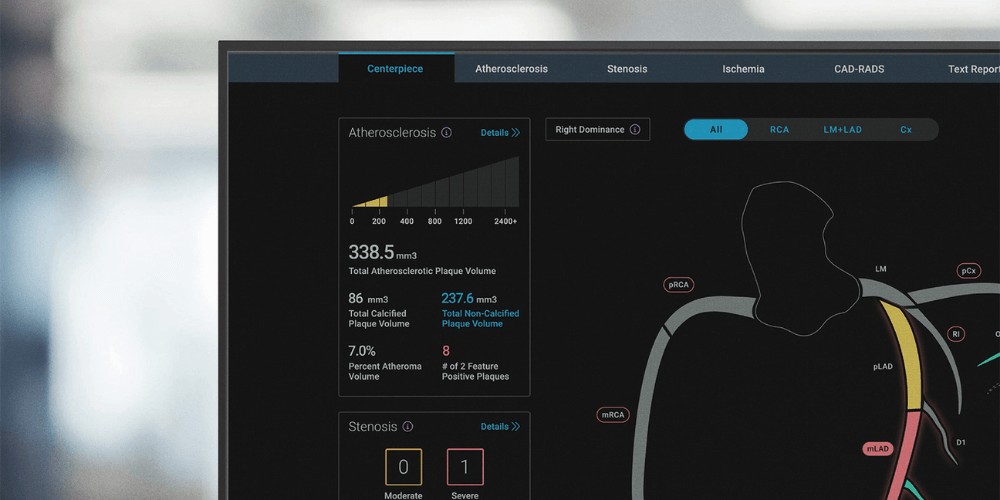
Cleerly provides AI-based analysis of coronary CT angiography to assess cardiovascular risk with greater specificity. Its platform quantifies plaque, characterizes arterial conditions, and offers structured reporting that supports clinical teams in refining cardiovascular evaluations.
Rather than relying solely on risk scores or symptoms, physicians using Cleerly’s tools can work from visual evidence generated through advanced imaging data. This supports earlier detection and more targeted approaches to cardiac care.
9. Verily
Verily develops precision health platforms that integrate clinical, behavioral, and molecular data to support targeted research and care delivery. Its technology stack is used by health systems and research organizations to align data management with high-compliance requirements.
Verily’s work includes tools for longitudinal data capture, cohort modeling, and digital biomarker development. These initiatives are applied across chronic disease management, decentralized trials, and population health programs.
10. Amazon (AWS)
Amazon Web Services builds cloud infrastructure that supports an expanding range of AI-driven healthcare solutions. Its services are used by providers, payers, and life science companies to manage clinical data, run large-scale analytics, and automate documentation workflows.
Products such as HealthLake and Comprehend Medical are designed to help organizations structure unstructured records, extract relevant insights, and scale AI applications in care delivery, research, and operations.
11. Microsoft
Microsoft continues to scale its AI capabilities in healthcare through Azure’s data services and its suite of intelligent health solutions. Its tools support hospitals and research institutions in managing clinical data, standardizing records, and applying machine learning to care delivery and operational planning.
The company also collaborates with life sciences organizations to accelerate clinical trials and improve patient engagement through cloud-based AI platforms.
12. Aidoc Medical
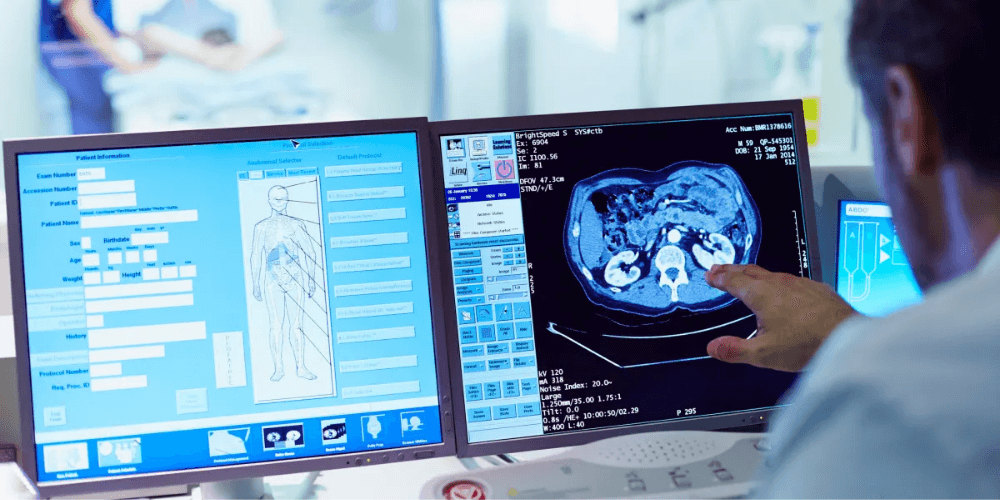
Aidoc develops clinical AI solutions that assist radiologists in identifying time-sensitive conditions such as strokes, pulmonary embolisms, and intracranial hemorrhages. Its platform supports hospital systems by integrating into existing workflows and providing automated alerts for critical findings.
The company’s proprietary aiOS infrastructure connects multiple algorithms into a unified system, supporting care teams across service lines. As a result, hospitals using Aidoc can organize imaging data around clinical urgency and reduce delays in high-risk cases.
13. CloudMedX
CloudMedX builds AI solutions that unify clinical, operational, and financial data across healthcare organizations. Its platform extracts insights from disparate systems to give providers a consolidated view of patient health and institutional performance.
The company’s focus lies in supporting hospitals and payers through predictive analytics that assist with care coordination, risk adjustment, and resource management. Its tools are used to address inefficiencies in both clinical pathways and administrative operations.
14. Komodo Health
Komodo Health applies AI to real-world data to track patient journeys and identify trends in population health. Its MapLab platform combines machine learning with structured datasets to support evidence generation and therapeutic analysis. With the launch of MapAI and MapExplorer, healthcare professionals can now query large datasets using natural language, making it easier to explore treatment outcomes and disease patterns.
The company’s technology is used by pharmaceutical firms, payers, and health systems to support research, market access, and clinical decision planning.
15. Cera
Cera delivers home-based healthcare supported by AI-driven monitoring and coordination tools. Operating across the UK and Germany, the company provides in-home services through a digital infrastructure that supports carers and nurses with real-time patient data. Its technology tracks changes in patient conditions and flags potential concerns for early intervention.
Cera’s platform is used to improve care continuity, lower hospital readmissions, and manage chronic conditions for aging populations. The company works with governments and insurers to expand access to home care using data-led models.
16. XpertDox
XpertDox builds AI-based automation tools for medical coding, serving organizations across primary care, pediatrics, women’s health, and community health centers. Its core platform, XpertCoding, uses machine learning, NLP, and structured analytics to process clinical documentation and generate codes with over 99% accuracy. The system is compatible with most EHRs and operates with minimal human input.
In addition to coding automation, the platform includes performance dashboards, audit logs, and documentation improvement modules that support revenue integrity and compliance tracking.
17. Augmedix
Augmedix develops ambient AI tools that convert clinician-patient conversations into structured medical documentation. Its technology captures spoken interactions in real time and generates notes, alerts, and data entries directly within EHR systems. The platform is used by hospitals and clinics to reduce the time physicians spend on administrative work.
Its database, built from millions of recorded encounters, supports continuous model refinement. As of 2023, Augmedix supports documentation workflows for hundreds of thousands of clinicians across care settings.
18. Verantos
Verantos focuses on real-world evidence generation by combining AI with advanced data curation methods. Its platform integrates information from EHRs, claims, and registries to produce research-grade datasets used in regulatory submissions, clinical development, and health economics. The company emphasizes traceability and validity, enabling its clients to run studies that meet rigorous scientific and compliance standards.
Verantos has engaged with multiple federal agencies and life sciences partners to support precision research and national policy initiatives.
19. Sword Health
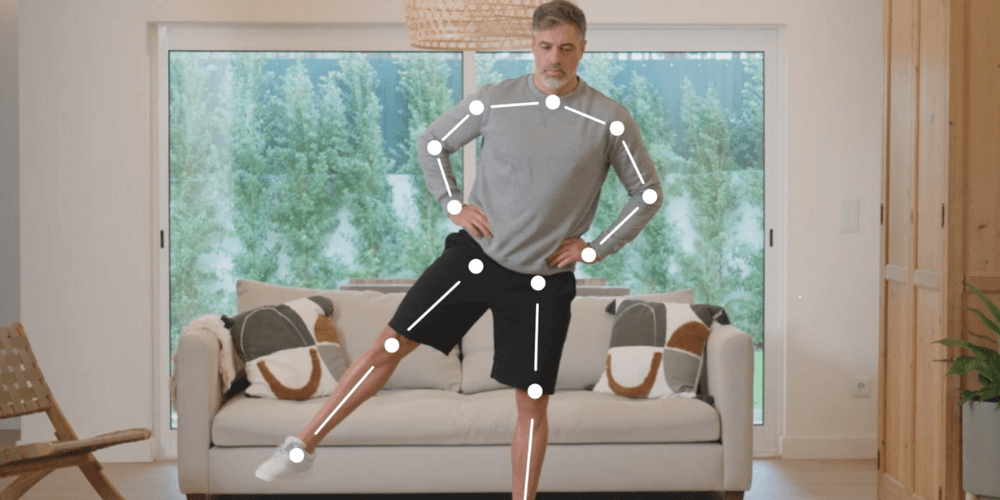
Sword Health delivers virtual care for musculoskeletal and pelvic health conditions through a hybrid model that connects patients with licensed therapists and AI-powered programs. Its system supports real-time feedback for physical therapy exercises, remote monitoring, and personalized recovery plans.
The platform is used across a range of conditions, including injury prevention, postpartum recovery, and chronic pain management. Sword Health’s approach is aligned with broader efforts to expand access to care without relying on in-person visits or high-cost procedures.
20. K Health
K Health offers virtual primary care services through an AI-powered platform that operates via mobile interface. The system uses predictive models trained on anonymized patient data to assist clinicians in diagnosing and treating a wide range of conditions. Patients can access care around the clock, with support for urgent needs, mental health, and chronic disease management.
By combining AI with licensed clinical teams, K Health aims to improve efficiency across care delivery while maintaining clinical oversight.
21. RapidAI
RapidAI builds clinical imaging software for vascular and neurovascular care. Originating from academic research at Stanford, the Rapid platform is now deployed in over 2,000 hospitals and has processed more than 14 million scans globally. Its AI models assist physicians in evaluating CT and MRI scans for stroke, aneurysm, and pulmonary embolism. These tools support time-sensitive assessments and help care teams act faster in emergency settings.
The platform’s adoption has been supported by validation from multicenter clinical studies and real-world usage across more than 100 countries. RapidAI’s portfolio spans triage, perfusion imaging, and treatment planning for high-acuity conditions.
22. CodaMetrix
CodaMetrix builds AI solutions that convert clinical documentation into structured billing codes across major specialties. Its system, developed within Mass General Brigham, uses natural language processing to support mid-cycle coding – a critical point in the revenue cycle that often requires significant manual work. By learning from clinical content and payer logic, the platform supports more accurate reimbursement and reduces administrative overhead.
CodaMetrix combines AI automation with human review to manage exceptions, allowing hospitals and medical groups to maintain oversight while scaling coding across high-volume workflows. Its platform is used by over 50,000 providers in the United States.
23. Butterfly Network
Butterfly Network develops portable imaging technology that combines semiconductors, AI, and cloud connectivity in a single device. The Butterfly iQ system, based on an Ultrasound-on-Chip architecture, replaces multiple probe types with a single, adaptable sensor. This form factor allows clinicians to conduct full-body scans using one device connected to a mobile interface.
Deployed in both urban hospitals and remote healthcare settings, Butterfly’s platform supports real-time imaging and data sharing. Its impact is visible in underserved areas where access to traditional imaging infrastructure remains limited. The company continues to expand its technology to support broader use cases in point-of-care diagnostics.
24. AI Superior
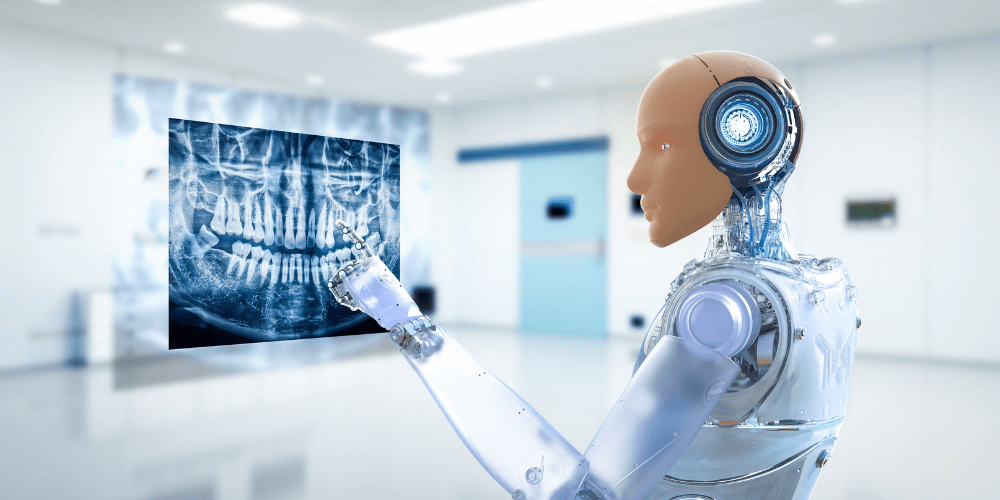
AI Superior provides AI consulting and solution development for enterprises across sectors, including healthcare. Founded by two PhD-level data scientists, the company delivers project-based implementations that align AI models with business goals. Its services cover the full life cycle, from design and model development to deployment and integration.
AI Superior places emphasis on clarity in communication, structured execution, and risk management throughout each engagement. The company has supported clients in applying AI to challenges such as predictive modeling, document automation, and intelligent systems design, contributing to measurable business outcomes in complex environments.
25. Arterys
Imagene develops AI-driven tools for precision oncology, with a focus on improving the speed and accuracy of cancer diagnostics. Its platform analyzes pathology images and integrates molecular data to identify biomarker signatures that are often missed in conventional workflows. These insights support oncologists in selecting targeted therapies and help pharmaceutical companies accelerate clinical trial enrollment.
Imagene’s technology is applied across both research and clinical environments, offering a scalable approach to biomarker discovery and predictive modeling. Since its founding in 2020, the company has worked with leading health institutions and industry sponsors to expand the role of AI in personalized cancer care.
26. Corti
Corti designs AI systems that assist clinicians during patient interactions by analyzing speech, generating documentation, and offering real-time prompts. Its solutions are used in emergency services, primary care consultations, and remote visits, where clinicians often face time pressure and high cognitive load.
The system listens to conversations between patients and providers, then structures the data into clinical notes and risk assessments. This approach allows healthcare professionals to focus on the content of the encounter rather than manual data entry. Corti’s platform is deployed in multiple languages and care settings, supporting both operational efficiency and clinical consistency.
27. Oncora Medical
Oncora Medical builds data platforms to support oncology workflow, research, and registry management. Its suite includes Oncora Patient Care, a documentation system that uses AI to streamline clinical note creation while aligning with billing and compliance requirements.
The company also offers Registry AI, a tool that automates the collection and processing of cancer data for reporting and quality programs. In addition, its Research AI product applies machine learning models to stratify patients based on clinical risk, supporting personalized treatment planning. These tools are designed to work across radiation therapy, medical oncology, and research departments, giving institutions a unified approach to oncology data.
Potentials of Artificial Intelligence Solutions by Healthcare Companies
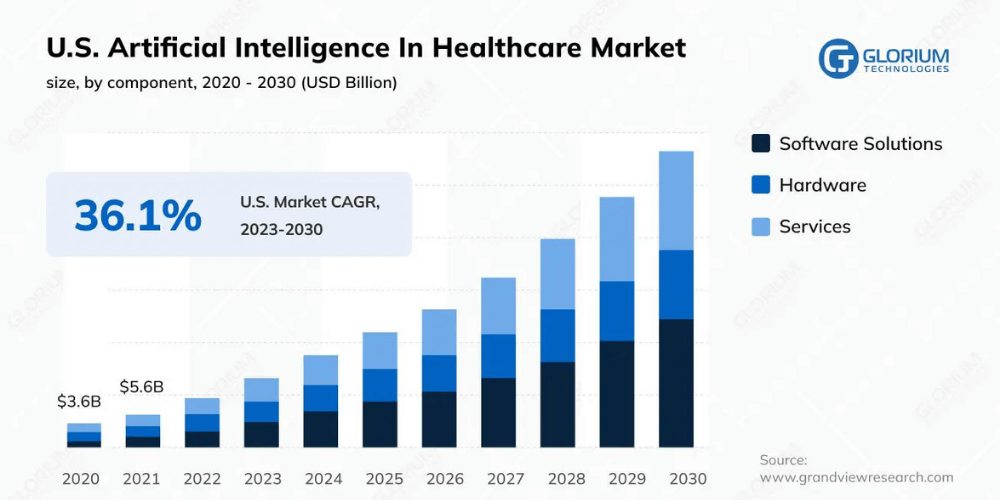
Artificial intelligence is reshaping healthcare delivery by creating new frameworks for decision-making, diagnostics, and operational performance. Healthcare companies are not only applying AI to optimize internal workflows but also shaping how patients, clinicians, and administrators interact with complex data.
The following areas illustrate where the impact is most visible:
- Clinical Decision Support
AI systems are being used to assist physicians with diagnosis, treatment selection, and risk assessment. These tools can process clinical notes, imaging data, and lab results to surface insights that align with current medical guidelines. In oncology, cardiology, and radiology, AI models support specialists by identifying patterns that may not be easily detected through manual review.
- Medical Imaging and Diagnostics
Companies are building AI platforms that interpret radiology scans, pathology slides, and ultrasound images in real time. These applications help prioritize urgent findings and standardize reporting across care teams. In high-volume environments, this contributes to faster interpretations and more consistent clinical outputs.
- Administrative Automation
AI is being applied to administrative functions such as medical coding, documentation, and revenue cycle management. Platforms trained on clinical language models and payer logic can process claims, generate structured records, and support compliance tasks with limited manual input. This allows health systems to reallocate time toward direct patient care.
- Remote Monitoring and Virtual Care
AI supports remote patient tracking through data collected from wearables, mobile apps, and digital consultations. These systems are designed to detect early signs of deterioration, suggest next steps, or notify care teams when thresholds are crossed. The technology is being used in chronic disease programs, aging care, and virtual primary care models.
- Real-World Data and Evidence Generation
AI tools help integrate clinical, claims, and registry data into research-grade datasets. These assets are used by life sciences companies to design trials, measure safety outcomes, and support regulatory submissions. The ability to extract patterns from unstructured records accelerates the pace of evidence development and expands the scope of real-world studies.
- Personalized Medicine and Predictive Models
By analyzing patient-specific data, AI systems can support therapy selection and predict response to treatment. In precision oncology, for example, machine learning models are used to match patients with clinical trials or targeted therapies based on molecular signatures and clinical profiles. This approach is also used in preventive care to stratify patients based on long-term risk markers.
While challenges remain around data governance, model validation, and clinical integration, the direction of innovation suggests that AI will continue to influence how healthcare is delivered, funded, and measured. Healthcare companies that invest in robust, scalable AI infrastructure are positioning themselves at the intersection of clinical care, research, and digital transformation.
Takeaways
The rise of top AI companies in healthcare signals a change in how medical organizations approach diagnostics, data systems, and care delivery. These companies apply AI to real-world clinical and operational needs, offering tools that align with regulatory frameworks while supporting continuity across patient journeys. Solutions span imaging, documentation, remote monitoring, and workflow coordination—each grounded in measurable use cases. As healthcare institutions evaluate AI adoption, the focus has shifted toward durable, outcome-focused partnerships. The companies leading this shift are those that deliver both technical precision and relevance within the healthcare setting.
For inquiries or collaboration opportunities related to GEM’s AI and IT services, don’t hesitate to contact our team.
